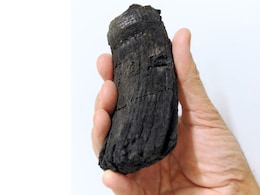Palaentology
- All
- News
-

Giant Tooth Of Ancient Marine Reptile Discovered In Alps
- Thursday April 28, 2022
- World News | Agence France-Presse
The fossils of three ichthyosaurs -- giant marine reptiles that patrolled primordial oceans -- have been discovered high up in the Swiss Alps, and include the largest ever tooth found for the species, a study said Thursday.
-
 www.ndtv.com
www.ndtv.com
-

Humanity's Strange New Cousin Is Shockingly Young - And Shaking Up Our Family Tree
- Wednesday May 10, 2017
- World News | Sarah Kaplan, The Washington Post
Homo naledi, a strange new species of human cousin found in South Africa two years ago, was unlike anything scientists had ever seen.
-
 www.ndtv.com
www.ndtv.com
-

Dinosaurs Took Months To Hatch Out Of Their Eggs. That May Have Doomed Them.
- Wednesday January 4, 2017
- World News | Sarah Kaplan, The Washington Post
Close examination of embryos found fossilized inside their eggs suggests that dinosaurs took as many as six months to hatch - far longer than their closest modern descendants, today's birds.
-
 www.ndtv.com
www.ndtv.com
-

Giant Tooth Of Ancient Marine Reptile Discovered In Alps
- Thursday April 28, 2022
- World News | Agence France-Presse
The fossils of three ichthyosaurs -- giant marine reptiles that patrolled primordial oceans -- have been discovered high up in the Swiss Alps, and include the largest ever tooth found for the species, a study said Thursday.
-
 www.ndtv.com
www.ndtv.com
-

Humanity's Strange New Cousin Is Shockingly Young - And Shaking Up Our Family Tree
- Wednesday May 10, 2017
- World News | Sarah Kaplan, The Washington Post
Homo naledi, a strange new species of human cousin found in South Africa two years ago, was unlike anything scientists had ever seen.
-
 www.ndtv.com
www.ndtv.com
-

Dinosaurs Took Months To Hatch Out Of Their Eggs. That May Have Doomed Them.
- Wednesday January 4, 2017
- World News | Sarah Kaplan, The Washington Post
Close examination of embryos found fossilized inside their eggs suggests that dinosaurs took as many as six months to hatch - far longer than their closest modern descendants, today's birds.
-
 www.ndtv.com
www.ndtv.com




